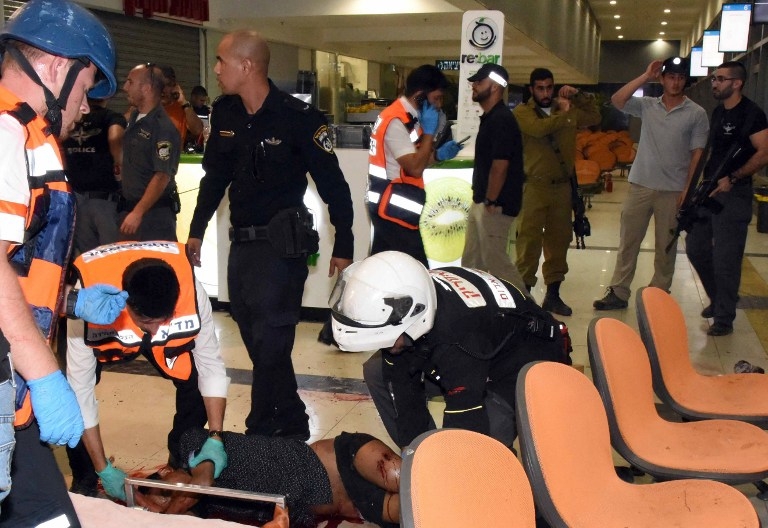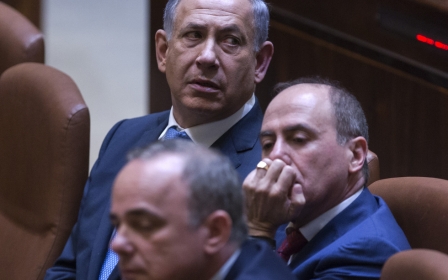Israeli police to investigate mob attack on Eritrean asylum seeker

Israeli police are investigating the circumstances around the killing of an Eritrean asylum seeker in what has been widely described as a lynching on Sunday in Beersheba.
Late Monday, the police, who said they "considered this incident as extremely serious," were reportedly hunting for those who were involved in the killing of 29-year-old Haftom Zarhum who was thought to be in the bus station, returning home after collecting visa papers in the southern Israeli city.
Prime Minister Benjamin Netanyahu warned Israelis against vigilantism in the wake of Zarhum's killing.
"We are a law-abiding country. No one must take the law into their own hands," Netanyahu told officials from his Likud party late Monday.
Zarhum, who was thought to have been in Israel for more than three years and working at a garden centre about 40 minutes from Beersheba, was shot by a security guard who believed he was a second attacker, then beaten by an angry mob.
The attack on Zarhum came after a gunman, who was also armed with a knife, stormed the central bus station in Beersheba, shooting dead 19-year-old Israeli soldier Omri Levi and wounding around 10 others.
The gunman, identified as 21-year-old Palestinian citizen of Israel Mohannad al-Aqaby, was killed, while a security guard at the bus station shot Zarhum reportedly thinking he was a second attacker.
A crowd then kicked Zarhum, hit him on the head while he was on the ground and pinned him down with a chair, according to local reports and footage of the incident that has appeared online.
As paramedics rushed Zarhum out of the chaotic scene, a crowd reportedly chanted "Death to Arabs", "Arabs out" and "The people of Israel still live" while trying to stop them, the Guardian reported.
"The bus was late and then someone started shooting," Amani Tewelde, a friend of Zarhum's - or Mila as he was apparently called - told the Guardian. "They shot him twice. Then I saw them kicking him. Someone found his visa and was holding it, shouting he's Eritrean, he's not a terrorist, but no one could hear him."
Zarhum, thought to be pictured below in an unverifiable photo being shared on social media, later died from his wounds.
'Foreseeable' tragedy
More than two weeks of unrest have raised warnings of the risk of a full-scale Palestinian uprising, while some Israeli politicians have urged residents to arm themselves to fend off the threat of stabbings and gun assaults.
The attacks and violent protests, which have erupted across Israel and the Palestinian Territories, have prompted a range of security measures, including the sealing off of East Jerusalem neighbourhoods where 300,000 Palestinian citizens of Israel live and where several assailants of attacks on Jewish Israelis in recent weeks have come from.
Israel last week rejected a proposal for international observers to police the Al-Aqsa Mosque compound where tensions have boiled over in recent weeks and which many point to as one of the sources of the recent violence.
Muslims fear Israel will seek to change rules governing the site, the third holiest site in Islam, which is located in Israeli-annexed East Jerusalem. It is also the most sacred site for Jews, who refer to it as the Temple Mount and who are allowed to visit but not pray there to avoid provoking tensions.
Netanyahu has said repeatedly he has no intention of changing the rules while Palestinian activists and politicians have said that Israeli incursions at the site, including the use of tear gas and rubber bullets to evacuate the complex in September, are unprecedented.
Sari Bashi, the Israel/Palestine director at Human Rights Watch, called Zarhum's death on Sunday a "tragic but foreseeable outgrowth of a climate in which some Israeli politicians encourage citizens to take the law into their own hands".
Al-Aqaby was among several Palestinian citizens of Israel to allegedly carry out attacks in recent weeks. Palestinian citizens of Israel make up some 17.5 percent of the Israeli population.
The mayor of Hura, who is also a Palestinian citizen of Israel and presides over the city where police said al-Aqaby was from, condemned the attack.
"We utterly and unreservedly condemn this despicable act and reject violence of any sort," said the mayor, Mohammed Al-Nabari.
Meanwhile, Hamas leaders Khaled Meshaal and Mousa Abu Marzuq are in South Africa for an official visit, where they met with President Jacob Zuma on Sunday and will address a rally on Wednesday.
“We are insisting with our people to finish this apartheid regime. This racist occupation should be put to an end,” Meshaal said during a press conference in the country on Monday.
The Israeli Foreign Ministry said that it was “angry and shocked” that the African National Congress (ANC) had received Meshaal, who they said was head of a “terrorist group”.
The visit comes despite an Israeli security crackdown as well as international calls for both sides to calm tensions.
Many of the attacks have seen young Palestinians with knives stabbing Israelis before being shot dead.
At least 41 Palestinians have died since the start of the month, including alleged attackers, while eight Israelis have been killed.
Stay informed with MEE's newsletters
Sign up to get the latest alerts, insights and analysis, starting with Turkey Unpacked
Middle East Eye delivers independent and unrivalled coverage and analysis of the Middle East, North Africa and beyond. To learn more about republishing this content and the associated fees, please fill out this form. More about MEE can be found here.





